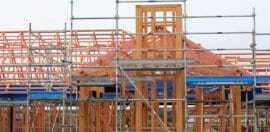‘It’s a continuation of the Stolen Generation’: How the social housing system is failing vulnerable Aboriginal women and their kids

19 February 2020 at 5:34 pm
Aboriginal parents in domestic violence situations are having their children removed at record numbers due to a lack of social housing, homelessness organisations say.
For the last two weeks, Mel* and her teenage daughter have been living in an emergency women’s refuge in Melbourne.
People who come to these refuges are meant to stay for two to three weeks at most – enough time for women like Mel, who have escaped a domestic violence situation, to find longer-term accommodation.
But with a severe shortage of social housing in Victoria, finding a secure place to live is becoming more and more difficult.
“I’ve got no idea where I’m going after I leave here [the refuge],” Mel told Pro Bono News.
“The only place for me is a tent out in the bush if I can’t find somewhere.”
As an Aboriginal woman, Mel is six times more likely than a non-Aboriginal woman to experience domestic violence, and 35 times more likely to be hospitalised because of violent assault.
With family violence a leading cause of homelessness, it puts Aboriginal women particularly at risk of homelessness.
Unstable housing also means there is a greater chance of having their kids taken away by Family Services.
According to university and state government supported studies, Aboriginal children are 10 times more likely to be removed from their families compared to non-Aboriginal children, and 88 per cent of Aboriginal children who are taken come from family violence situations.
It’s something Mel regularly worries about.
“Since I left my partner and moved interstate at the start of January, we’ve been in two motels, an Aboriginal hostel and now this place,” she said.
“Getting my daughter taken away from me is something I often worry about. She’s the only thing that’s stopping me from going back [to my partner] because I’m so desperate to just have a house.
“It’s why people like me give in and go back to what they know. It’s just the shit life I live with.”
Barriers at every turn
Kelleyanne Andy is the CEO of Elizabeth Morgan House (EMH), an Aborignal-run refuge and crisis support centre for Aboriginal women and children who have experienced family violence.
She said the people who walk through EMH’s doors often can’t afford private rental, and even when they can afford it, face discrimination in the rental market, so are forced into public or community housing.
“It can take months to even get into temporary housing, and years to get a long-term social housing place,” Andy said.
“Our clients feel backed up against a wall. They have to choose between being transient in short-term accommodation with the risk of having their children taken away, or returning to violent relationships, risking their safety.
“What we’re seeing with rates of current child removals is the continuation of the Stolen Generation.”
She said EMH has a policy against asking women to leave until they have other accommodation, but the longer they have to stay in crisis accommodation, the worse it is for them and their children.
“Because refuges are not classified as stable accommodation Family Services can’t work with children in the interim and it means they just don’t get the attention they need,” she told Pro Bono News.
“One time we had a woman and her kids with us for seven months because she had nowhere else to go.”
A housing-first approach needed
Groups such as Council to Homeless Persons (CHP) have long advocated to adopt the “Housing First” model, which moves people with complex needs experiencing homelessness into permanent affordable housing with flexible and individual support for as long as needed.
The model has seen great success in countries such as Finland, the only European country where homelessness has decreased.
But advocates say the first step for Australia is to build more housing stock.
Research commissioned in 2017 by the Victorian state government to determine how many new social housing units were needed specifically for family violence victims, found around 1,700 long-term social housing dwellings per year for 20 years had to be built to meet current demand.
From 2016 to 2019, Victoria’s social housing stock has grown by 1,331. Homelessness and housing groups such as EMH and CHP say while the increase is welcome, it still falls well short of what is actually needed.
Acting CEO of CHP Kate Colvin said the system was not working for Aboriginal women fleeing family violence, and that more properties operated by Aboriginal community controlled organisations such as EHM had to be built.
“Creating more social housing would mean women and children could safely escape violence and rebuild their lives in a safe home,” Colvin said.
While Mel isn’t sure how long it will be before she finds a more permanent place, she’s holding out hope it isn’t too much longer.
“I just want something over our head so we can all live together,” she said.
If you, or anyone you know is experiencing family violence, please call 1800 RESPECT for help.
*Names have been changed to protect identity







